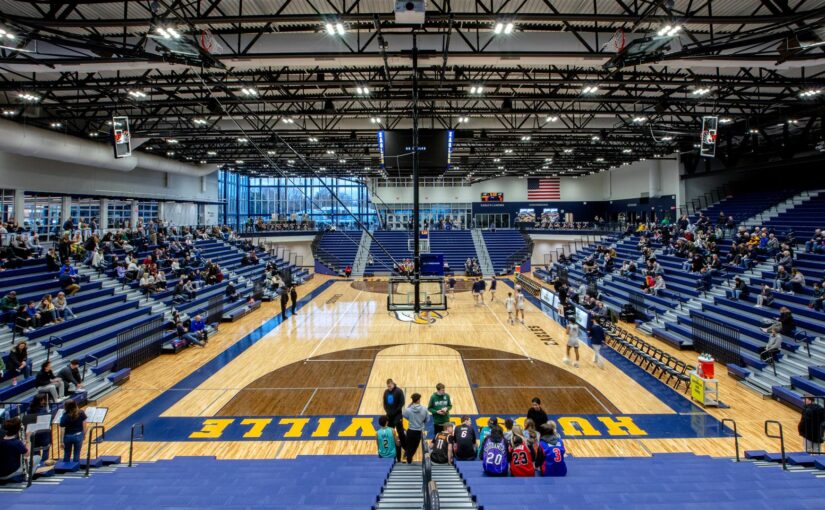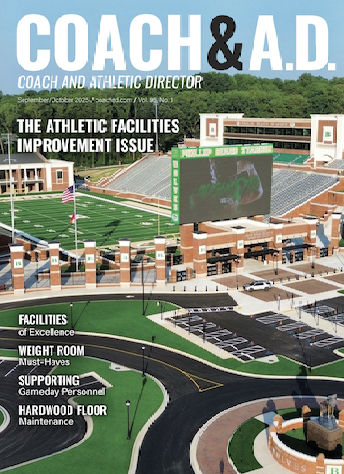Contingency Plans
Considering the complexity of our positions, the number of participants, coaches, and contests that we direct, and the endless responsibilities we have, something surely has to go wrong sometimes.
Even though we plan and have good procedures in place, something is going to go out of control and throw a monkey wrench into our efforts.
Are you ready for these sudden, unusual problems? Have you thought through every situation and have contingency plans in place?Let’s start with a relatively simple one. If your scoreboard goes blank during a basketball game, you go running for the flip scorecards, whistle or air horn and stopwatch so that you can finish the game. (Of course, you first checked to see if the control panel has become unplugged!)
We also have to deal with officials who may be late or fail to show up for a contest. We immediately call the assigner and he either reassures us that they are on their way or immediately dispatches two substitutes to fill the void.
Most of us have an evacuation plan with public-address announcements should the lights go out in the gym or if there is a gas leak. We also know that at the first sign of lightning, we have to get our teams off the field and wait for 30 minutes after the last strike. These situations are kind of straightforward, but what about those that are less common?
The following questions and considerations may help with preparing contingency plans.
1. Can you quickly contact coaches, your head custodian, security personnel, and opposing athletic director if there is a sudden problem with one of your facilities or transportation?
While many of us commonly have these important phone numbers posted on the wall in front of our office phone, we should also be prepared if we happen to be at home, out on one of the fields, or even in our car.
Not only do I have a copy on my school computer, but also on my laptop, my home computer and in a folder that is always in my briefcase. I often put a photocopy of this list in my back pocket when I leave for our stadium, and I also believe it would be a good idea to post one in your ticket booth or press box. Now you are always ready for the unexpected.
2. What do you do if your Internet server or your hard drive crashes? Even though many of us have become totally dependent upon e-mail, we may have to temporarily go back to the phone and fax. However, our inability to access necessary documents on our computer could prove to be a major problem. It’s thus important to develop a system of backing up your files onto a disk or CD.
Determine what is best for your schedule. Is it easier for you to do it at the end of a week or on a monthly basis?
3. Do you know whom to contact for help? While most AD’s are certainly proficient with responsibilities – such as hiring coaches, checking eligibility, and scheduling contests -there are also numerous items on which we may have no background or experience.
This is normal, because you can’t be expected to know everything.
Most likely you may need help with technical things such as repairing your grounds equipment, a crashed computer, and electrical problems with your sound system and scoreboards.
Often, your head custodian, other AD’s, and perhaps a knowledgeable parent might be able to point you in the right direction. You don’t have to know everything – just who to contact if something goes wrong.
4. Does a sudden situation or development need immediate attention or do you have until next season to find the solution? Obviously, a venue evacuation or lightning strike requires your instant attention, and that also means that you will have no time for input.
When able to solicit suggestions and possible solutions, you can take perhaps a more informed, better course of action. Time, or the absence of it, can affect your contingency plans.
5. Can you think creatively when something unusual occurs? Certainly, you will always open your ticket booth with enough change on hand. Then seemingly every fan will plop down $20 bills and you will run out of $1 bills.
You can run into your school for additional change if you have any on hand, or you can send one of the ticket sellers out to a local store to see if they could help. But have you ever thought of opening a “special” exact change line? Not only will this speed up the process of getting fans into their seats, but you will also come up with much needed $1 bills.
Many situations can be overcome with a little creative thinking and once you’ve discovered a solution it should become a standard option in your contingency plans.
6. Do you periodically check your supplies and equipment needed for your contingency plans? Your flashlights, for example, which you store in your gym or stadium, are of little value in an emergency if you don’t have functional batteries. It is also possible that during summer cleaning, someone might have moved the flip cards and air horn.
These are simply two quick examples. It would be wise to add every item that may be used in your contingency plan to a periodic checklist, so that you can truly be ready for that unexpected emergency.
In football, when a team has struggled to move the ball, they can always punt, and in basketball, we can always call a time-out to make an adjustment.
Wouldn’t it be nice if we could take these same steps as an athletic director? But since we can’t, we’d better think through as many situations as possible, analyze what could go wrong, and develop contingency plans.





